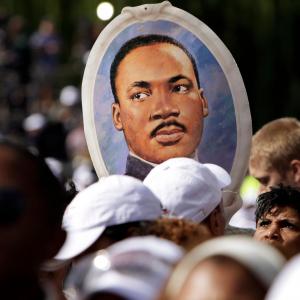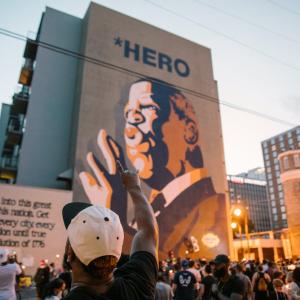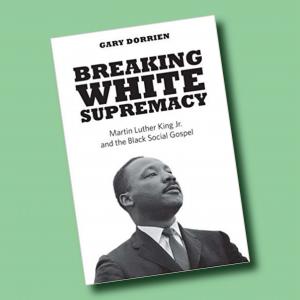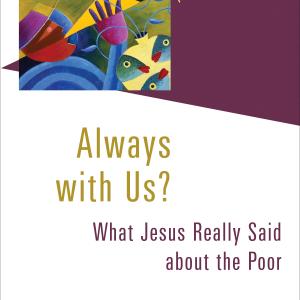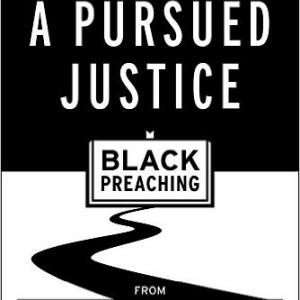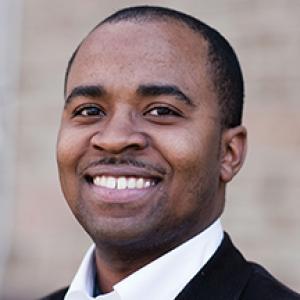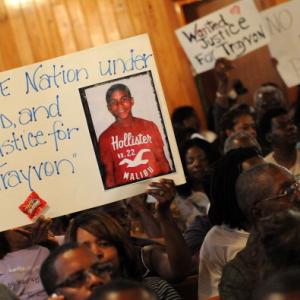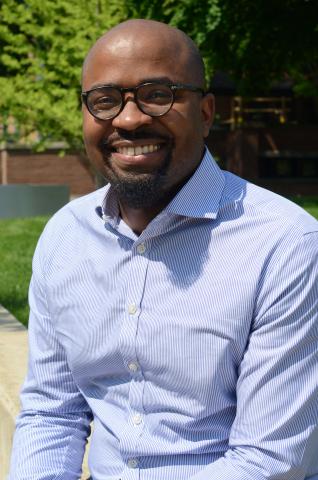
Rev. Andrew Wilkes is the founding co-lead pastor of The Double Love Experience and a Ph.D. candidate in political science at the CUNY Graduate Center.
Posts By This Author
MLK Rooted His Anti-Capitalism In His Christian Ministry
In order to understand King's life and legacy, it is critical that his activism be understood in the context of his call as a minister. In 1956 a sermon titled, “Paul's Letter to American Christians,” King called for a “better distribution of wealth.” He also asserted that “God never intended one people to live in superfluous inordinate wealth, while others live in abject deadening poverty.” Holistically interpreting King’s theological work as a pastor, public theologian, and faith leader requires grounding his anti-capitalism in his self-identification as a “minister of the Christian gospel.”
Don't Believe The Lie: The Black Freedom Struggle Never Ended
For many today, the Black freedom struggle has become a myth. Our ancestors are memorialized in their death while crucified in their life. For many, it has become a symbol of progress: a symbol of the progress of America, particularly white America, to finally “get it.” It is a powerful myth.
We Can Do Better Than Capitalism
On June 28, 1894, the United States government designated the first Monday in September as a holiday to commemorate the achievements and contributions of American workers. Christians, like other people of faith and conscience, have a complicated relationship with employment, exploitation, and our global political economy. We should explore what it could mean to forge an economy that more adequately respects—and protects—various forms of labor than our current socioeconomic arrangement of racialized capitalism.
Good News
Breaking White Supremacy: Martin Luther King Jr. and the Black Social Gospel, by Gary Dorrien. Yale University Press.
THE BLACK SOCIAL gospel is a critically important religious tradition—one that Gary Dorrien gives exquisite treatment in Breaking White Supremacy: Martin Luther King Jr. and the Black Social Gospel. This is the second installment of a two-volume series. The first, The New Abolition: W.E.B. Du Bois and the Black Social Gospel, won the prestigious Grawemeyer Award in Religion. The black social gospel, Dorrien explains, focuses not only on a political economy of justice—on matters including labor, land, and democratic use and ownership of capital—but also, unlike white social gospels, on racial equity.
Breaking White Supremacy explains the family tree of transformative religion that birthed Martin Luther King Jr.’s unique, but not unprecedented, practice of Christianity in Jim Crow America. Dorrien contends that mystic and author Howard Thurman, Morehouse College president Benjamin Mays, and Howard University president Mordecai Johnson provided examples of black Christian piety for King, which along with liberal theological education at seminaries in the northern region of the country shaped King to push America to become the social democracy it has never been.
How to Liberate Scripture
Always with Us? What Jesus Really Said about the Poor, by Liz Theoharis. Eerdmans
MOST RADICAL JESUS theologies begin with the gospel of Luke. In a tour-de-force work, Liz Theoharis’ Always with Us? What Jesus Really Said about the Poor illustrates that the gospel of Matthew also offers a relevant statement of “God’s coming reign of abundance, dignity, and prosperity for all.” Centering this effort is Theoharis’ striving to “rethink the role of the church in the world and to challenge some of the most widely held misinterpretations of the Bible and poor people.”
Appropriate, accurate interpretation of Matthew 26:11, where Jesus says to the disciples that they have the poor always with them, is the burden of the book. In performing this task, Rev. Dr. Theoharis, founder and co-director of the Kairos Center for Religions, Rights, and Social Justice and coordinator of the Poverty Initiative at Union Theological Seminary, demonstrates the rarefied exegete’s blend: granular analysis and big picture vision. She effectively critiques the various theological justifications for structural poverty that stem, in part or whole, from a mishandling of this passage.
Crafting the Prophetic Voice
A Pursued Justice: Black Preaching from the Great Migration to Civil Rights, by Kenyatta R. Gilbert. Baylor University Press.
MARTIN LUTHER KING JR. did not initiate black prophetic preaching; he was, rather, initiated into it. Rev. Kenyatta Gilbert’s A Pursued Justice: Black Preaching from the Great Migration to Civil Rights is a theological origin story about the distinctive rhetorical tradition that is black prophetic preaching.
The text begins by naming the social crisis of the Great Migration—shorthand for a massive demographic shift of 1.5 million African Americans from the South to the North between 1916 to 1940—as an essential context for understanding black prophetic preaching. This tradition of Christian proclamation—which Gilbert calls “exodus preaching”—is framed in the context of black pastors seeking to respond theologically to the pressures of injustice, prejudice, and segregation that black migrant workers navigated in Northern urban communities in the inter-war period. Of special note, Gilbert surfaces the social gospel tradition of African-American clerics who, unlike white social gospel leaders Walter Rauschenbusch, Josiah Strong, Washington Gladden, and others, demonstrated a desire to not only build institutional churches that confronted industrial evils but also to address systemic issues of lynching, police brutality, and so on.
While the entire book makes an important contribution to the study and practice of preaching, the third chapter, in particular, sparkles with insight. Within it, Gilbert marshals a solid cast of intellectuals—including Paulo Freire and Zora Neale Hurston—to land on a four-part definition of prophetic preaching. He contends that prophetic preaching unmasks systemic evil, remains hopeful in difficult situations, aids listeners in naming their own reality, and displays a will to adorn. The criterion of adornment—with patient attention to aesthetic categories of beauty, vision, and desire—is some of the most creative theological writing, in any genre, that you are likely to read. On a practical level, the definition provides a yardstick against which working preachers and homiletics faculty can assess the strength of contemporary pulpit work.
Leaving Pharoah
Pillars of Cloud and Fire: The Politics of Exodus in African American Biblical Interpretation, by Herbert Robinson Marbury. NYU Press.
HEBERT ROBINSON Marbury’s Pillars of Cloud and Fire: The Politics of Exodus in African American Biblical Interpretation achieves the distinction of providing fresh insight in well-covered territory. Marbury, with imagination and impressive intellectual range, explores the uses of Exodus by African Americans in struggles for freedom, respect, and full inclusion into the democratic mechanisms of American political life.
For the past four decades, scholars in fields as disparate as African-American religious history, preaching, rhetoric, constructive theology, and American studies have noted a fundamental duality: White Christian immigrants perceived Britain as Pharaoh and America as the Promised Land; enslaved Africans, by contrast, saw America as a strange land in which white Christian immigrants were Pharaoh. Instead of covering this important though beaten path, Marbury employs an alternative strategy.
What’s his take? Marbury’s book acknowledges this rich history, specifically the first two generations of African-American biblical scholarship. Then he pivots quickly to define cultural studies as a foundational discipline anchoring his reading of the text. What this means is that Marbury unpacks the significance of scripture by assessing the canonical account as well as the life-world and aims of individual interpreters who employ what Hebrew Bible scholar Renita Weems calls reading strategies for the text. The arc of Marbury’s analysis stretches from the antebellum era to the black power movement.
Another Way is Possible
An interview with Andrew Wilkes on Christianity and socialism.
Andrew Wilkes is an African Methodist Episcopal minister who serves on the editorial board of Democratic Socialists of America’s online journal, Religious Socialism. Danny Duncan Collum interviewed him in October 2015. Click here to read more about Christianity and socialism in this month's Sojourners.
Sojourners: Why have you chosen to identify yourself as a socialist?
Andrew Wilkes: What began to change my thoughts is when I realized that another way of organizing land, labor, and capital is possible and was already happening locally, regionally, and in some respects nationally. Gar Alperovitz’s book What Must We Then Do?, John Nichols’ book The “S” Word, and Martin Luther King Jr.’s witness of a black social gospel and democratic socialism all proved seminal to me.
What does it mean to you to call yourself a socialist? Socialism, on a basic level, prioritizes human rights over property rights and our obligations to one another over conventions about the natural, efficient operations of markets. Socialism means a way of making decisions about the use of resources that seeks to end preventable human misery more than turning an ever-increasing profit. It’s an ethical vision that also entails shared sacrifice for mutual gain—for instance, paying more in taxes to support health care, education, and other services that are free at the point of access.
I do not take socialism to mean the complete abolition of private property, contracts between individual parties, or the utter erasure of markets. Instead, socialism for me means the ascendancy of meeting human needs through public provision, cooperative ownership, and private businesses that include collective bargaining and government regulation. It also means that working individuals who produce goods and services have a significant say in shaping, owning, and influencing the institutions that shape their day-to-day quality of life.
How do you see those ideas relating to your Christian identity and Christian ministry? I joined the Religious Socialists of DSA (Democratic Socialists of America) to find an institutional outlet for my political commitments. I think it’s inaccurate to suggest that the Bible can be marshaled in direct support of socialism. I do think that every Christian has to inquire about the society that best represents or foreshadows the dreams and desires of God for humanity. For me, the kind of socialism I’ve just described is the best society.
#DialInForJustice
To be black in America is to listen to death daily. To hear mothers wailing at unnecessary funerals, to see fathers mourning lost sons, to offer graveside prayers that puncture the heart of God — this is the sorrow song of a people, and a nation, haunted by racism.
Over our heads however, I hear the sweet, dark sounds of freedom in the air, calling for the dry bones of democracy to arise from the segregated sinews of our society. The multiracial chorus of protestors chanting, "I can't breathe," the die-ins, the walk-outs, and the highway-halting actions of youth from New York to Chicago to Tallahassee to Los Angeles represent a thirst and hunger for righteousness that includes and yet transcends voting.
To join within this symphony of justice, I am calling faith communities to participate in a national #DialInForJustice during the month of December. The goal is to call the Unites States Department of Justice and local police departments, communicating our desire to see systemic reforms to policing in America. This initiative seeks to lift up faith-filled voices alongside the already existing trumpet blasts of groups like the Organization of Black Struggle, Dream Defenders, PICO, Sojourners, and so on.
A Handbook for Justice
"Faith-Rooted Organizing: Mobilizing the Church in Service to the World," IVP Books
FAITH-ROOTED Organizing: Mobilizing the Church in Service to the World outlines a theological cartography of social change. In this critical intervention, Alexia Salvatierra and Peter Heltzel reimagine—and as a necessary consequence, rechart—the landscape of vision, action, and strategic planning needed for social change.
Full disclosure: I have attended several trainings conducted by the co-authors. Indeed, the dual authorship of the text is a principal strength. Faith-Rooted Organizing blends the voice of an evangelical-activist theologian in Heltzel with the homespun profundity of a seasoned pastor and campaign organizer in Salvatierra. The authors delight readers with complementary writing styles: Heltzel speaks through theological propositions, interpolated intermittently with jazz references and theological punch lines; Salvatierra communicates through proverbs, organizing anecdotes, poignant biblical passages, and narrative side notes.
The result is a well-argued and accessible text that should resonate from the seminary to the sanctuary. Their driving thesis is that faith communities, especially Christian ones, should organize for social change in a way that is rooted and guided by the stories, symbols, sayings, and scriptures of our faith. Faith-Rooted Organizing functions as an instruction manual on effective advocacy while providing a theological rationale and vocabulary for a vocation marked by tremendous victories and colossal failures, breakthrough partnerships and fragmented coalitions, glimpses of beloved community and portraits of democracy stillborn.
The Church's Alternative Currency
"The Economy for Desire: Christianity and Capitalism in a Postmodern World"
DANIEL BELL'SThe Economy of Desire juxtaposes Christianity and capitalism, situating both in the context of postmodernity. The main argument of the book is that performing works of mercy—both corporal and spiritual—constitutes an alternative economy that can resist capitalism. Capitalism, in Bell's construal, is an economic system founded on voluntary contracts, private property, and an ideological regime where the rule of the market transcends the rule of law and disregards the reign of God in Christ.
The author draws on the work of philosophers Michel Foucault and Gilles Deleuze to set up a philosophical framework for talking about power and desire. His treatment of Foucaultian insights on the ubiquity of power is meant to decenter the state as the primary engine of social change. Deleuze's work builds on Foucault's argument by conceptualizing people—and society at large—as flows of desire. Taken together, the claim is potentially but not necessarily democratic: Social structures organize desire in particular ways and are malleable due to the fact that power resides not only in the state or market but in the relational networks of everyday people. Under this account, for instance, the typical presidential election is not simply about securing votes, but about directing the aspirations and actions of the electorate toward a collective passion for growing the economy, expanding the middle class, and so on. Capitalism, for Bell, secures our loyalty because it shapes what we do as well as what we desire.
A few strengths of the book stand out. It contains a lucid discussion of the difference between commutative (fair contracts) and distributive (fair proportion of wealth, power, and other goods) justice within society. The scope of the author's analysis is also impressive. Bell substantively engages the arguments of diverse figures from Adam Smith, Milton Friedman, and Friedrich von Hayek to Augustine, Thomas Aquinas, and Martin Luther. Moreover, Bell's contention that proponents of capitalism effectively deny the possibility of social holiness is worth the price of the book.
Power and the Poor
"The Rich and the Rest of Us: A Poverty Manifesto"
THE RICH AND THE REST OF US is a stirring call to arms on eradicating domestic poverty. Co-authored by Cornel West and Tavis Smiley, the self-described "poverty manifesto" seeks to convince readers that economic mobility is increasingly difficult for three demographics—the long-term poor, the new poor, and the near poor. Who are the poor in America? According to the Supplemental Poverty Measure, 150 million Americans are at or below twice the federal poverty level, which is $22,040 for a family of four.
Smiley and West invoke Dr. Martin Luther King Jr.'s legacy throughout the book. King's imprimatur legitimizes their attempt to translate the Occupy Wall Street themes of the wealthy 1 percent and the financially fragile 99 percent for a general audience. Interestingly, the book contains a motivational quality reminiscent of self-help books. Each chapter and subsection opens with an inspirational quote or pithy observation. The authors employ statistics, personal anecdotes, poems, and trend analysis to demonstrate the magnitude of poverty in America.
Making poverty history, to use a popular phrase, is an important ideal. To achieve it, we must ask: Who is responsible for eradicating poverty? The co-authors argue that engaged citizens, an active civil society, and a proactive government are the principal agents for helping impoverished families. In several instances, President Lyndon Johnson's War on Poverty represents the promise of the aforementioned three-pronged approach to mitigating the structural causes and personal implications of poverty. From 1964 to 1973, the writers note, the Johnson administration reduced the national poverty rate from 19 percent to 11 percent. Smiley and West successfully contend that government programs play an indispensable role in eradicating poverty.
How to Proclaim Restoration
"Missional Preaching: Engage, Embrace, Transform" by Al Tizon
AL TIZON’S Missional Preaching, as one might expect, is designed for those who proclaim the gospel. The text, moreover, should prove useful to homiletics professors, local ministerial groups, and church bodies seeking to encourage more reflective approaches to the craft of sermon-making. Tizon, an ordained minister in the Evangelical Covenant Church and professor of evangelism and holistic ministry at Palmer Theological Seminary, writes with lively prose, frequently deploying humor and hyperbole to complement biblical exposition and theological reflection.
For Tizon, missional conviction is about joining “God’s mission to transform the world, as the church strives in the Spirit to be authentically relational, intellectually and theologically grounded, culturally and socio-economically diverse, and radically committed to both God and neighbor, especially the poor.” Tizon’s commitment to mission is both theological and autobiographical: The author spent nine years doing community development in the Philippines and currently serves as the director of the Word and Deed network of Evangelicals for Social Action.
Structurally, Tizon begins with three chapters on missional theology, covering liturgy, biblical perspectives on mission, and the missio Dei (the mission of God). For Tizon, missio Dei signifies God’s restorative purposes for the world, beginning with Israel and consummating in Christ. To complement the opening essays, each subsequent chapter pairs Tizon’s reflection on a missional topic with a sermon on the same subject matter. In a particularly compelling chapter, the author’s insights on whole-life stewardship are concluded by a riveting homily from Shane Claiborne.
Justice for Trayvon Martin: Million Hoody March
On February 26, 2012 in Sanford, Fla., George Zimmerman shot and killed Trayvon Martin, an unarmed 17-year-old boy. Zimmerman, 28, a neighborhood watch "captain," says he was acting in self-defense, and — incredibly — Zimmerman has yet to be arrested or charged with a crime.
However, thanks to the organizing efforts of Mr. Martin’s parents, civil rights groups, media commentaries, and concerned citizens, our latest racialized miscarriage of criminal justice is now getting the widespread attention that it deserves.
On Monday, the US Department of Justice and the Federal Bureau of Investigation (FBI) announced it would launch an independent investigation into the causes and circumstances of Mr. Martin’s death.
Three bonus reflections
Graduates reflect on how their seminary education impacts their work of social justice today.
